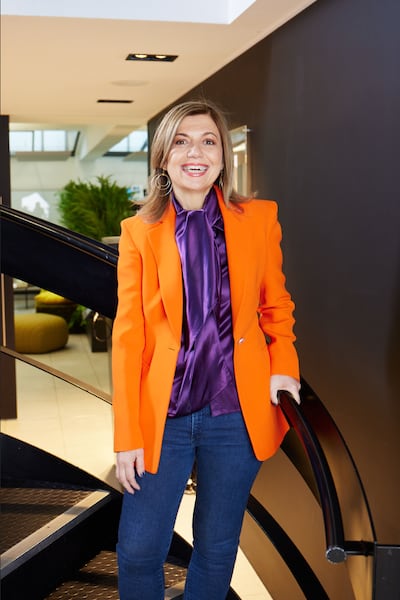
The author has shared a YouTube video.You will need to accept and consent to the use of cookies and similar technologies by our third-party partners (including: YouTube, Instagram or Twitter), in order to view embedded content in this article and others you may visit in future.
A convergence of factors is transforming what it takes to build and maintain a successful beauty brand. Consumers are more informed than ever and trend cycles continue to accelerate. New paths to purchase are emerging, creating challenging trade-offs in where to invest, while conversion rates drop as the dynamic between influencers and consumers evolves.
Concurrently, sourcing ingredients and maintaining timely distribution strategies and effective logistics has become more challenging as climate change-related disruption impacts global trade networks. In this context, staying close to consumers and providing them with the right products and the right time is more challenging than ever.
To discover how Unilever Prestige approaches staying relevant and how it believes brands should navigate challenging market conditions to do so, BoF sat down with outgoing chief executive of Unilever Prestige, Vasiliki Petrou, at The Business of Beauty Global Beauty Forum 2024, held in Napa Valley, California. Unilever Prestige is one of the industry’s most respected strategic buyers and the leader of a 10-brand portfolio that includes Tatcha, Hourglass, Dermalogica, Ren and the newest addition to the Prestige portfolio is science-led hair care brand K18, which sits at the intersection of premium beauty and biotechnology.
Unilever Prestige’s brand portfolio generated €1.4 billion in revenue in 2023, with 13 successive quarters of volume-led growth up to Q1 2024. Some of its brands having doubled (Tatcha) and even tripled (Hourglass) in turnover since joining Unilever. Now, BoF shares Petrou’s key insights from the Global Beauty Forum 2024.
Customer segmentation should better reflect identity and interests
VP: There is discussion in the industry about breaking down categories and that’s a very true reflection of how individuals are shopping today. One thing that is key now is: how do you execute audience segmentation in a way that is informed by the desires of the most relevant people? We need to establish what their personalised interests are. What are the lifestyle preferences that matter most? What are these super personalised interests that can be scaled.
Because when you go very niche, often it’s not big enough, so you have another issue. But if you can scale a “niche of niches” in terms of a cultural zeitgeist, then segment, I think you are onto something there. We are now at the point where we are asking, how do you do audience segmentation according to the zeitgeist?
Authentic brand identity should inform engagement strategies
VP: Everything you do needs to be in tandem with your authenticity as a brand. You need to leverage the strengths of the retailers and manifest yourself in the way that your audiences expect to see you. Some people will be good at services and consultations, others in education or speed of delivery.
I always encourage our leaders to play while bringing your unique strength to our retailers and the consumers. It needs to be not only a dual win, for brands and retailers, but a triple win: for brands, retailers and consumers. If you go with your authentic self and try to serve your audience best by leveraging the relevant channel strategy relevant, that’s how you connect to your community.
Marketing strategies should embrace the evolution of influence
VP: Generation Z are changing how they consume beauty and they are becoming a bigger part of it. Then you have the Gen X and the Baby Boomers that have been neglected to a point. I’m currently obsessed with each element of staying relevant, because everything is changing so fast.
The media keeps fragmenting and the influencer and micro-influencer scene is constantly changing. We have always talked about community, but I think community is taking a new shape. It goes beyond the needs of my skin, the right colours or a hair diagnostic — it’s very much understanding lifestyle, anticipating needs. It’s personalisation to the next level.
If you go with your authentic self and try to serve your audience best by leveraging the relevant channel strategy, that’s how you connect to your community.
We all need to be constantly re-inventing ourselves. Today, brands need to be like a life partner, a coach, a friend. It’s a multi-phase, long-term partnership. The standard is increasingly high in terms of how well you understand your community’s needs, how specifically you can talk to them and be there for them. It’s not easy to do, but I think the brands that invest in doing this well will be the ones who benefit.
Infrastructure and ingredients must evolve to match consumer need
VP: We are definitely looking to onshore a lot of packaging material goods next to the places where we manufacture the product. It’s a multidimensional topic — if you look at it from an ingredients point of view, then can be complicated. You need to assess different segments of consumers.
Some want clean beauty, while others are driving a huge movement focused on effectiveness. The more you play with new retinoid materials, for example, the more you need to lean into biochemistry and synthetic biology. There is a regulatory framework that you need to comply with — it’s not easy, but it keeps it exciting.
When I am looking at any potential acquisition, the first question I ask myself is: ‘Is it going to be around in 10 to 15 years from now?’
We are experimenting quite a bit right now with glass packaging and [replaceable] cartridges that you can take in and out. Obviously, the consumer needs to pace that as well. This is where retailers can also help.
Long-term relevance is inconsistent with short-term founders
VP: When I am looking at any potential acquisition, the first question I ask myself is: “Is this brand going to be around in 10 to 15 years from now?” This is the multi-billion-dollar question. If a founder says they plan to exit in four years, this wouldn’t work for our model. If [a founder has] that frame of mind, it’s going to push [them] to make the wrong moves in terms of short-term tactics, like distribution that is too broad too quickly.
You have to always be focused on: “How can I make sure my brand is going to exist for the next 30 years?” If you have that mindset, then you’re going to make the right steps. If you think about Dermalogica and the continuous upskilling and training that we do with their professional skincare therapists, I don’t think [the founder, Jane Wurwand] thought: “I’m going to do this because I’m going to sell.” She thought: “How can I serve them the best way?”
If your mindset is “I am here for a quick exit,” I don’t think you’re going to succeed.
This interview has been edited and condensed for clarity. At the time of the interview, on June 4 2024 at the Global Beauty Forum, Visiliki Petrou held the position of CEO at Unilever Prestige. She has since announced her departure from the role, effective end July 2024.
This is a sponsored feature paid for by Unilever Prestige as part of a BoF partnership.



